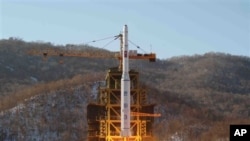In 2022, the DPRK has launched 31 ballistic missiles, including six intercontinental ballistic missiles, an intermediate-range ballistic missile, and at least two claimed hypersonic glide vehicles. All these launches violated multiple UN Security Council resolutions. In addition, reports indicate that Pyongyang is preparing to conduct a nuclear test for the first time in five years.
In the face of these provocations, the United States introduced a resolution at the Security Council in May strengthening sanctions on the DPRK over its ballistic missile launches. However, for the first time in 15 years, a dangerous division occurred in the Security Council regarding the DPRK. While thirteen members voted in favor of the resolution; Russia and the People’s Republic of China, two permanent members of the Council, voted to veto it, ensuring its defeat.
On June 8th, at a discussion of the UN General Assembly over the vetoes cast by Russia and the PRC, Ambassador Jeffrey DeLaurentis, Senior Advisor for Political Affairs at the U.S. Mission to the United Nations, said the vetoes showed “implicit approval” of the DPRK’s dangerous and destabilizing actions: “Thirteen Council members chose to send a strong message to the DPRK that its unlawful WMD and ballistic missile development will not be tolerated and to send a signal to all proliferators that there should be consequences for their behavior. Two did not.”
Ambassador DeLaurentis noted that earlier this year, Russia and the PRC pledged a “no limits partnership.”
“We hope these vetoes are not a reflection of a partnership elevated above the collective interest of this body, or of the multilateral institutions mandated to ensure the safety and security of us all,” he said.
The United States has repeatedly made clear that it seeks dialogue with Pyongyang without preconditions, and the commitment to a diplomatic path with the DPRK remains. The United States has also made clear that, together with its allies, it will maintain a strong deterrent capacity and will seek implementation of all multilateral and unilateral sanctions.
At the UN, Ambassador DeLaurentis declared the United States will continue to work “regularly, diligently, and transparently with the Security Council, our allies and partners, and all Member States who seek to stop the DPRK’s unlawful WMD and ballistic missile programs and uphold the values of nonproliferation.”
A Dangerous Division Over the DPRK

A dangerous division occurred in the UN Security Council regarding the DPRK. While thirteen members voted in favor of the resolution to strengthen sanctions; Russia and the People’s Republic of China, two permanent members of the Council, voted to veto it, ensuring its defeat.





